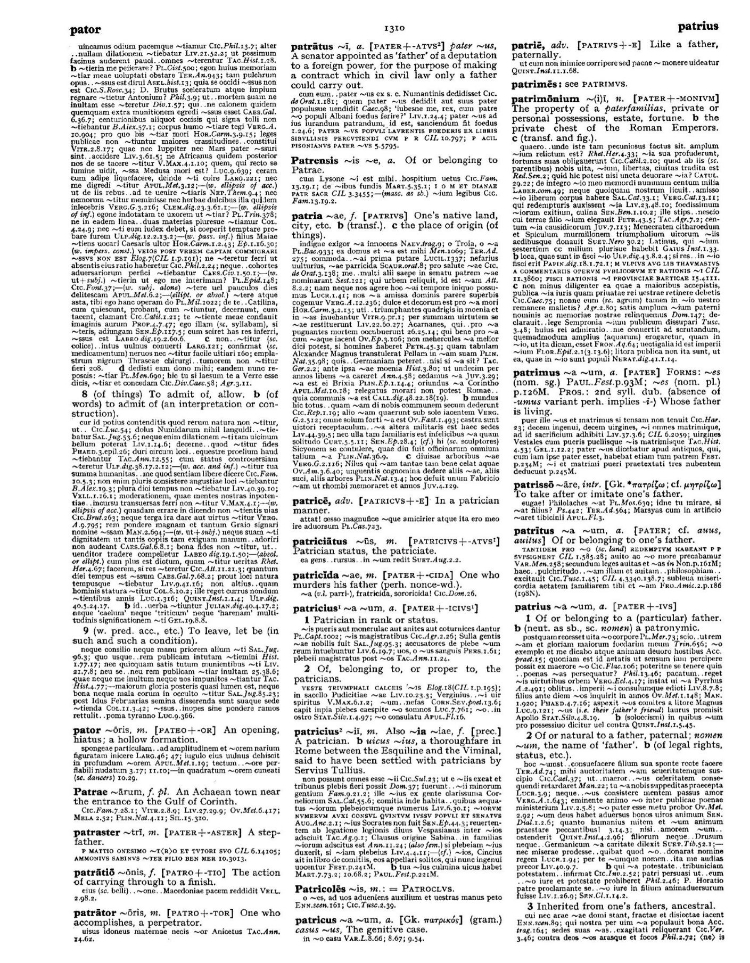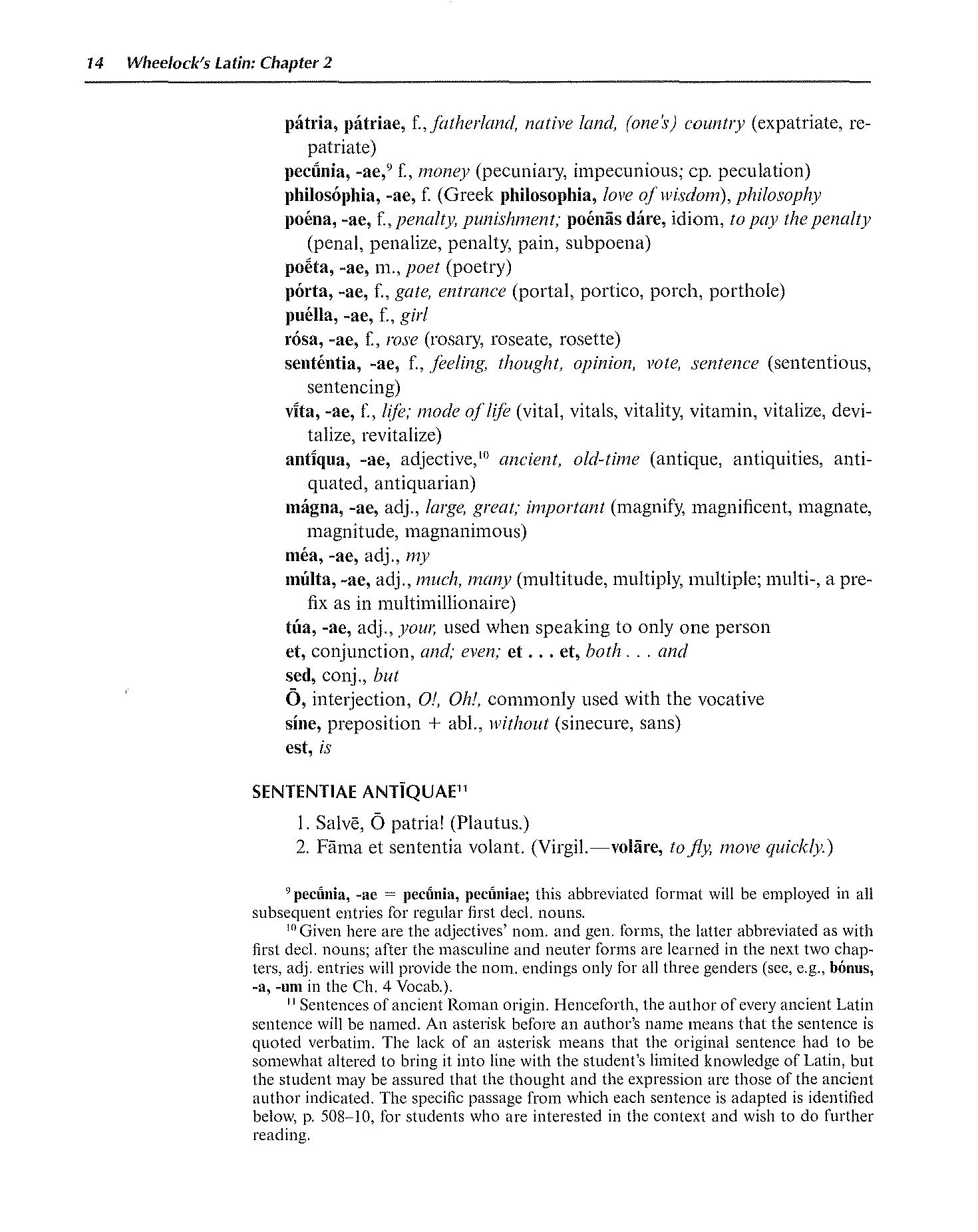
page_listing.tpl
page_subListingDetails.tpl
sub_listingDetails_style1.tpl
sub_listingDetails.title.tpl
patria fatherland
patria is a Latin Noun that primarily means fatherland.
Definitions for patria
Wheelock's Latin
Noun
- 1
fatherland, native land, (one's) country
English derivatives:
expatriate repatriate
Oxford Latin Dictionary
Noun
- 1
One's native land, city, etc. (b) (transf.). (c) the place of origin (of things).
Sentences with patria
Latin to English
Tē, Ō patria lībera, semper amābāmus et sempter amābimus.Compare Free fatherland, we always used to love you and we always shall love (you).
Amor patriae in cīvitāte nostrā valēbat.Compare Love of country was strong in our state.
Patria nostra cuique adiuvanda est quī nostrum modum vītae amat.Compare Our country ought to be helped by each one who likes our mode of life.
Omnēs cīvēs sē patriae dent nē hostēs lībertātem tollant.Compare Let all citizens dedicate (give) themselves to the country so that the enemy may not take away their liberty.
Ōrātor nōs hortātus est ut līberae patriae nostrae cum studiō servīrēmus.Compare The speaker urged us to serve our free country eagerly.
Abeat ā patriā iste homō malus quī odium omnium cīvium bonōrum passus est.Compare Let that evil man depart from his country—he who has endured the hatred of all good citizens.
Fecisti patriam diversis gentibus unam; profuit iniustis te dominante capi; dumque offers victis proprii consortia iuris, Urbem fecisti, quod prius orbis erat. (Rutilius Namatianus, On His Return I.62-66)Compare O Rome, the world is yours and you its queen. Far distant tribes become one fatherland beneath your power, which brought to conquered men the rule of law and through this common right, you made a city out of all the world.
Nunc vero nec locus tibi ullus dulcior esse debet patria nec eam minus diligere debes, quod deformior est, sed misereri potius.Compare No place should be dearer to you than your homeland, nor should you love it less because it has grown uglier, but rather pity it the more.
Declension table for patria
Cactus2000
| Singular | Plural | |
| Nom. | patria | patriae |
| Gen. | patriae | patriārum |
| Dat. | patriae | patriīs |
| Acc. | patriam | patriās |
| Abl. | patriā | patriīs |
Data sources
Notes
- Definitions
- Frederick M. Wheelock, Wheelock's Latin, 6th ed., rev. Richard A. LaFleur (New York, NY: HarperCollins Publishers, 2005): 14.
- P. G. W. Glare, Oxford Latin Dictionary, Vols. 1-8 (Oxford: Clarendon Press, 1982): 1310.
- Word frequencies
- Christopher Francese, "Latin Core Vocabulary," Dickinson College Commentaries, last modified 2014, http://dcc.dickinson.edu.
- Paul B. Diederich, The Frequency of Latin Words and Their Endings, PhD diss., (Columbia University, 1939).
- Louis Delatte, Suzanne Govaerts, Joseph Denooz, and Etienne Evrard, Dictionnaire fréquentiel et index inverse de la langue latine [Frequency Dictionary and Inverse Index of the Latin Language] (Liège, Belgium: Laboratoire d'analyse statistique des langues anciennes de l'Université de Liège [L.A.S.L.A.], 1981): 121.
Bibliography
Allen, Joseph H. Allen and Greenough's New Latin Grammar for Schools and Colleges: Founded on Comparative Grammar. Edited by James B. Greenough, George L. Kittredge, Albert A. Howard, and Benjamin L. D'Ooge. Boston, MA: Ginn & Company, 1903.
Crystal, David. A Dictionary of Linguistics and Phonetics. 6th ed. Oxford, UK: Blackwell Publishing, 2008.
Delatte, Louis, Suzanne Govaerts, Joseph Denooz, and Etienne Evrard. Dictionnaire fréquentiel et index inverse de la langue latine [Frequency Dictionary and Inverse Index of the Latin Language]. Liège, Belgium: Laboratoire d'analyse statistique des langues anciennes de l'Université de Liège (L.A.S.L.A.), 1981.
Diederich, Paul B. The Frequency of Latin Words and Their Endings. PhD diss., Columbia University, 1939.
Francese, Christopher. "Latin Core Vocabulary." Dickinson College Commentaries. Last modified 2014. http://dcc.dickinson.edu/latin-vocabulary-list.
Gildersleeve, Basil L., and Gonzales Lodge. Gildersleeve's Latin Grammar: Third Edition, Revised, and Enlarged. 3rd ed. London, England: Macmillan and Co., 1903.
Glare, Peter G.W. Oxford Latin Dictionary. Vols. 1-8. Oxford, England: Clarendon Press, 1982.
Krüger, Bernd. "Latin Conjugation Tables." Cactus2000. Accessed May 5, 2023. https://latin.cactus2000.de/index.en.php.
Pierson, Nick. "Sound of Text." Accessed October 26, 2019. https://soundoftext.com.
Wheelock, Frederick M. Wheelock's Latin. 6th ed. Revised by Richard A. LaFleur. New York, NY: HarperCollins Publishers, 2005.
Wiktionary Contributors. "Victionarium." Wikimedia Foundation, Inc. Updated March 18, 2019. https://la.wiktionary.org/wiki/Victionarium:Pagina_prima.
Citation
Chicago (17th ed.)
Allo Contributors. "patria, patriae (n.) - Latin Word Definition." Allo Latin Dictionary. Last modified . Accessed February 20, 2026. http://ancientlanguages.org/latin/dictionary/patria-patriae.
Entry created on . Last updated on .







